Meg Ryan on the essentials of good rom-coms — and her long-awaited return to them
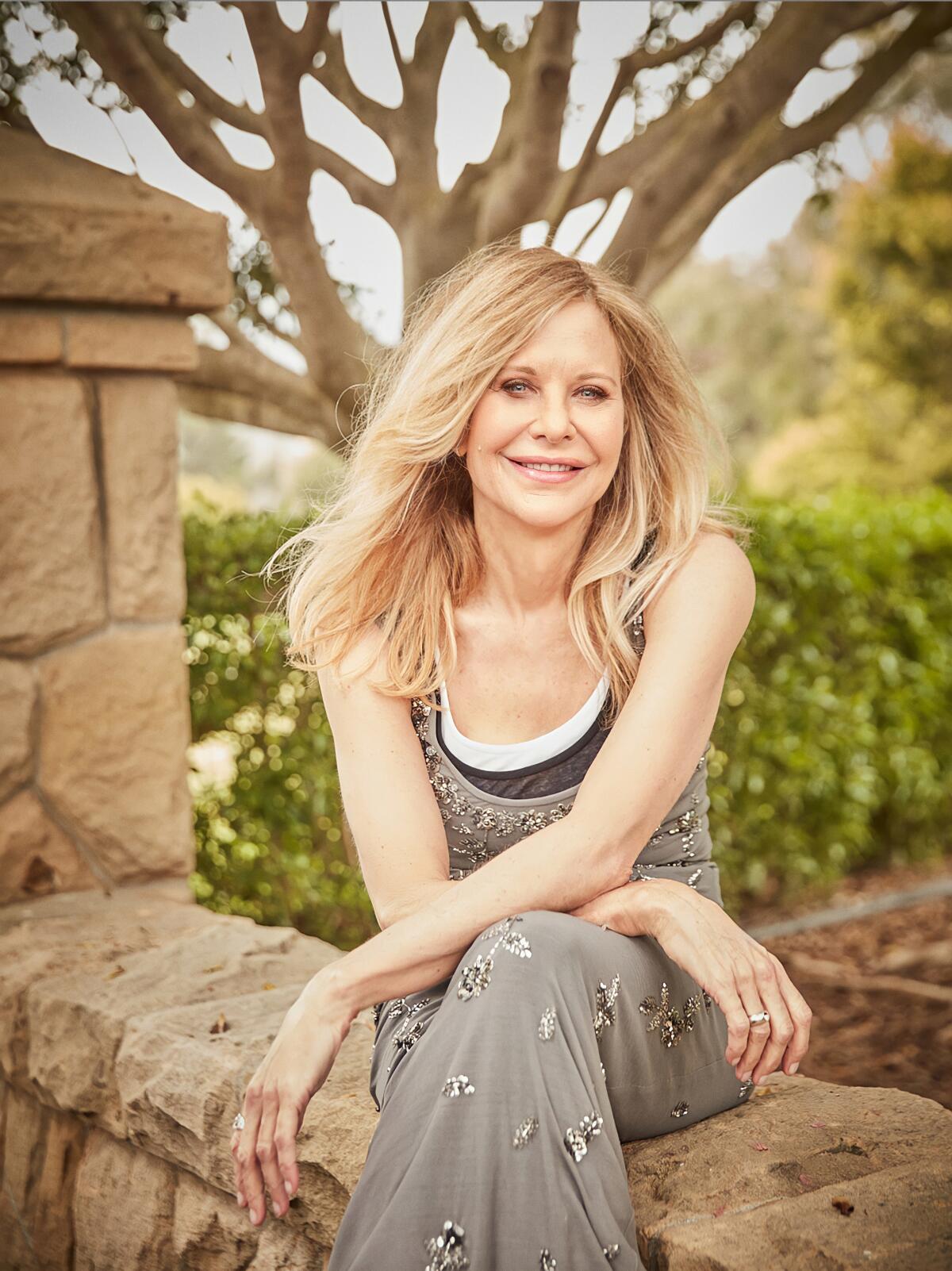
- Share via
Meg Ryan wanted to make a movie that felt like being in love.
But if you think that means sunshine and rainbows, think again. In Ryan’s world, at least lately, love is about unavoidable yearning, bittersweet nostalgia and the ability to hurt — or heal — a person in a way only exes can. As a lover of rom-coms, I didn’t expect what I got with “What Happens Later.” And, for that matter, my interview with Ryan wasn’t what I expected either.
The actor co-wrote and directed her new film based on a 2008 play by Steven Dietz called “Shooting Star.” (It’s Ryan’s second time behind the camera, after making her directorial debut with 2015’s non-rom-com “Ithaca.”) Co-starring David Duchovny, the story focuses on two college sweethearts who, decades after their breakup, find themselves stuck together in a snowed-in airport. Ryan, 61, worked on the script during the pandemic and the ache for connection is a palpable undercurrent.
After an eight-year hiatus from the big screen, “What Happens Later” is being billed as Ryan’s return to the genre that made her famous. But the film itself slyly subverts rom-com tropes, playing with the magical lightness of romance while delving into the pain of lingering heartbreak.
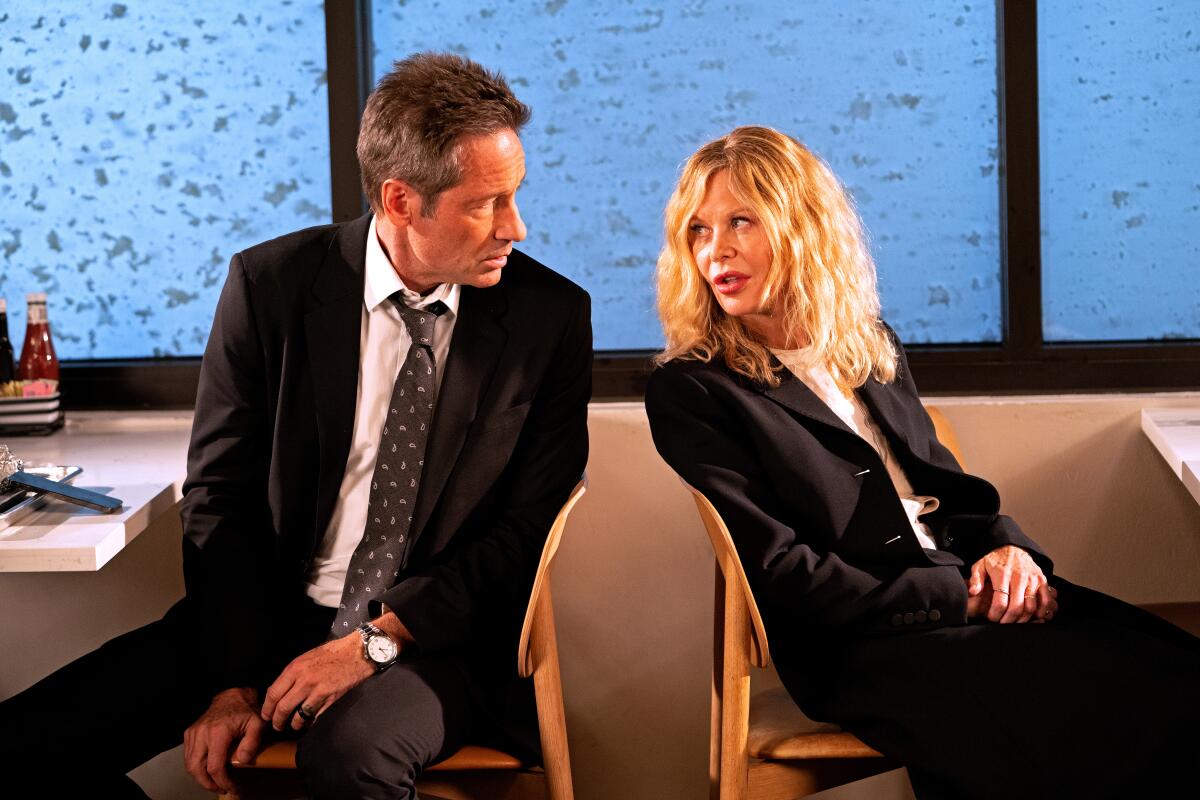
“It’s a love story with rom-com elements,” Ryan says in her one-on-one interview with The Times. Ryan is notably averse to talking to the press and she’s an absolute pro at re-directing the conversation back to her film. However, because the themes of her film are so universal, reality weaves its way in and out of our 40-minute conversation. “As a writer, your life always somehow informs the product,” Ryan says.
She humbly calls herself a student of rom-coms. At first it seems like a gross understatement, but I think it’s how Ryan genuinely sees herself: a student of romance, of love, of relationships. She’s also trying to figure it out, retracing the past, pressing on the bruises of breakups to see if they still hurt and why. At the end of our talk she thanked me for experiencing the movie the way she hoped the audience would, and it‘s an indicator of how she sees it all, as an experience. She’s not just directing it — she’s on the ride with us.
“What Happens Later” is a universal story about “the one that got away,” about relationships that go and come back. What drew you to that?
There are relationships we have that we don’t really understand. It’s not logical, not rational. These two have a very intense connection. It was a defining relationship in her life. The same for him.
The shape of their love story is: connect, disconnect, connect, disconnect. They’re just going to screw it up in perpetuity. And that’s who they are.
There’s that line from your film — I’m paraphrasing — it’s about breakups and it says there’s the story you tell each other, the one you tell your friends and then there’s the truth.
We hopefully set the mystery up for the audience right there. The feeling of, wow, I’ve had those breakups. I think most people have not always understood their breakups, and you try to make sense of it. It’s just such murky territory for human beings.
When you were working through the script with David Duchovny did you do a lot of — I don’t want to say trauma bonding but sharing your own experiences of breakups?
It was sort of inevitable to go, “Well, in my case…” and it wasn’t necessarily specific. As a writer, your life always somehow informs the product. Maybe not as literally as an audience would imagine, like: Is that a song about so and so? It’s almost never literal. As a writer you learn everything is for you. Everything of yours and everything of everyone else’s is for you to use. All of a sudden, you’re a conduit for that, you’re open to that, you’re paying attention, you’re listening to those stories and those things end up in a script.
Even if they’re not always positive ones?
They never directly say it, but they’re asking each other, “Why didn’t you love me enough?” I love that they don’t have a meet-cute. They had heartbreak. They broke each other’s heart and hopefully what the movie is going toward is that there’s a difference — the “happily ever after” in this movie is them coming to some sort of terms about being grateful for one another. This idea that I’m glad it was you who broke my heart.
I love that.
They do all these really heroic, impossible, emotional things. It’s very hard to forgive someone who broke your heart.
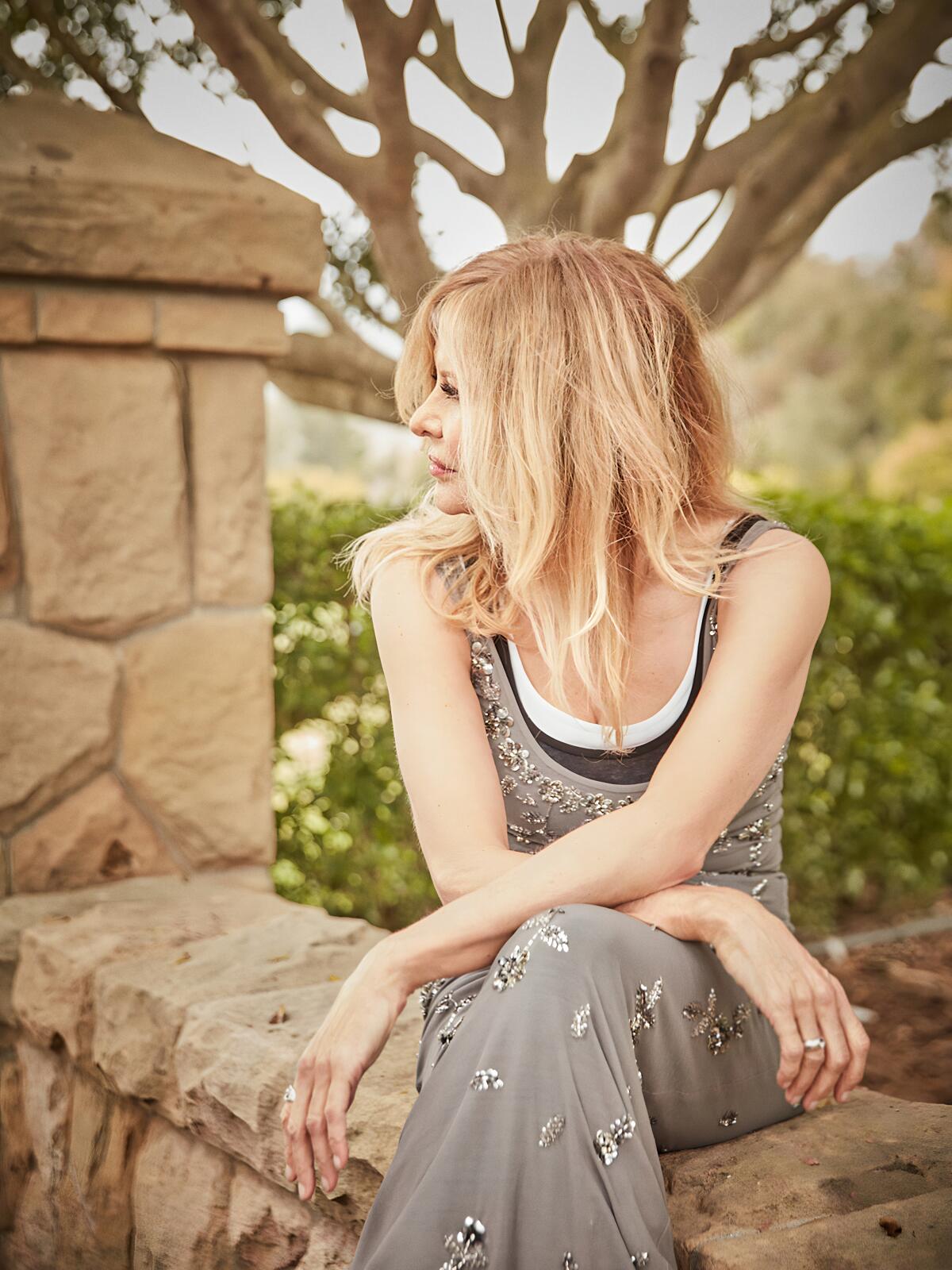
You mentioned the idea of “happily ever after.” When you were writing this script, did you set out to subvert that?
We wanted to inform it differently, to say there are different ways to think of happily ever after. This is maybe a little esoteric and will never make anyone want to go see the movie, but I love this idea that they are willing to be held accountable. They listen, they get their facts straight. These are things in our world right now that are very hard to come by.
They’re full people and they’re looking back on a life not lived with one another. I love that we’re talking about this, Lorena but —
I know, we are starting to get into spoilers.
I love that this is not a dystopian story. It’s a love story with rom-com elements — that’s how I think about it. And love stories are really only as good as their obstacles. In this case, the obstacles are who they are.
She instantly worries him and that’s his nature, this catastrophic thinker, his anxiety. Her nature is just the opposite. So I love those opposites.
And what is it about airports in love stories that feels so romantic?
It’s where you have no control, and you’re given over to forces that have nothing to do with you. You’re not in charge. It’s the liminal space we all have in common. The transitional space between one place or state and another.
In airports, time seems to stop. It doesn’t feel the same. And Tom Petty, I was thinking about his music so much when I was writing it. There’s a lyric, “I woke up in between a memory and a dream,” and that’s these two. They wake up in between a memory and a dream and that’s the plot. They don’t have the same memory of the past. They have to put it together.

Do you think there’s an element of rom-coms that requires that the relationships be a little bit toxic? Or am I being too much like a character in your movie?
[Laughs] You know, I’m a student of them too, rom-coms. There are these magical elements that intervene — at least in some of the movies I did with Nora [Ephron] — this idea of kismet as a larger force. They didn’t know it, but they’re perfect for each other and their lives are headed toward each other.
And when this [project] came to me at the beginning of the pandemic and we were in lockdown, I remember the ache for connection — to go to a bar, to be with other people, to have them throw you off or delight you. But we were isolated. And that’s a big part of this movie: what the isolation and concentration can do, and what their environment is imposing on them and asking them to be their best selves.
This is a $3 million movie [shot] in 21 days and our DP shines it up like a jewel. When you don’t have a ton of money, you’re trying to figure out how to up your feeling of scope and production value. We didn’t even have a sound designer. We had a mixer who loved the movie and took some work home. It’s just a beautiful confluence of people who really wanted to make a movie that felt like being in love.
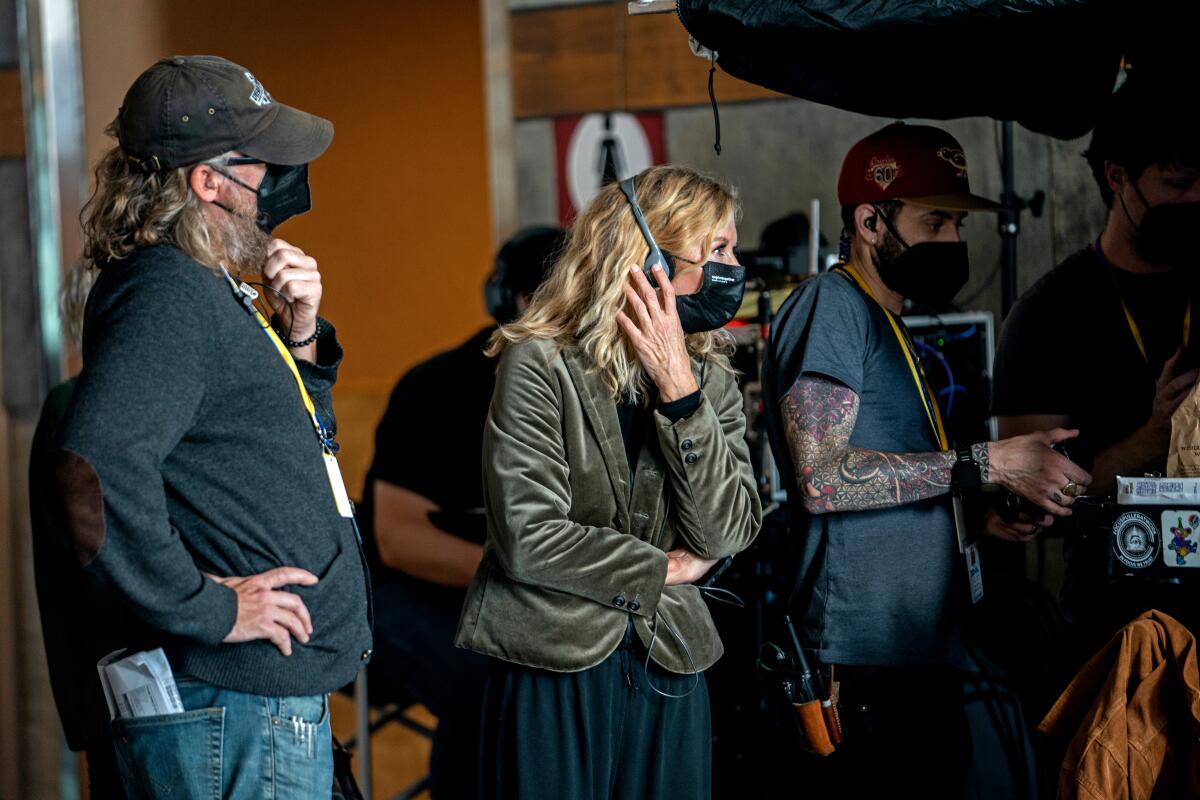
You mentioned some of the Nora Ephron movies you did. Do you ever look back and think about whether those characters would have stayed together past the final scenes in the film. Like, are Harry and Sally still together?
No, not really. I don’t think about that, but I like that they pique the imagination of people watching.
There’s a lot of bickering between your characters — is that an essential element of the rom-com?
Definitely, banter is a romance language. Because it’s about rhythm, right? I loved “His Girl Friday” and I would read all about that. How did they do that? Rosalind Russell and Cary Grant are a divorced couple. They have exactly the same rhythm, brand of intelligence, quirks. They’re lighting each other’s cigarettes. They are in total syncopation and the guy she’s engaged to, Ralph Bellamy, [drops her voice and slows down her pace] talks like this. And simply because he just didn’t fit in their rhythm, he was never going to be part of their world.
This genre uses language. Rhythm is the love language. What was fun doing this with David is we’d get in the editing room and go like, “Wow, his best take was her best take.” That really had to do with harmonics. Rhythm and banter is part of it, opposites are part of it. But mostly it’s caring about the two of them. And it’s an intelligent kind of banter, not just fighting.
A witty back and forth.
They hate that they’re getting a big kick out of each other. And he goes, “This is exactly what I loved about you and it’s exactly why we broke up.” That’s it.
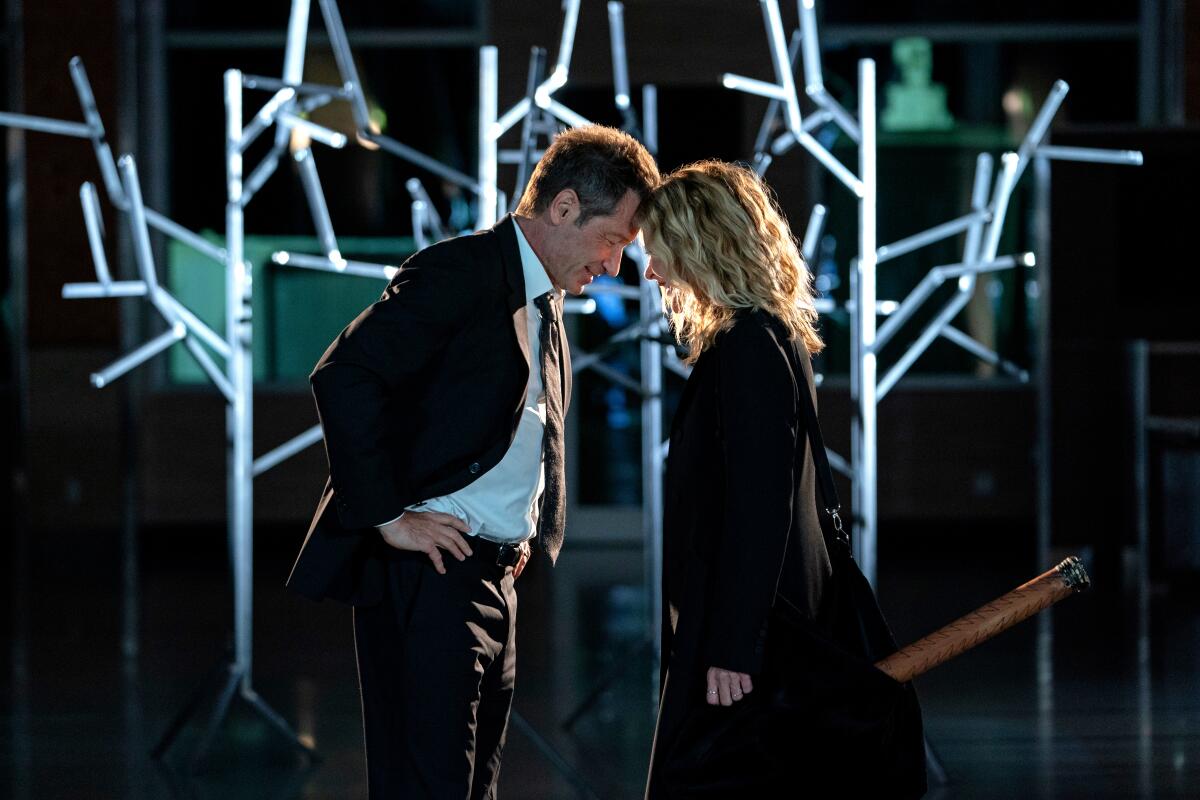
Another element of rom-coms is nostalgia, which can be good or bad.
It’s like they jump in a time machine. It’s really about what happened before. It’s about what’s happening right now. It’s about how that gets all mixed up.
Was it a goal of yours to work on a love story like this?
It wasn’t really a goal but increasingly it became a movie I wanted to see. I loved Bradley Cooper’s “A Star is Born.”
I just rewatched it yesterday on the plane.
I love that movie. I love the feeling of yearning in that movie, how intense it is. It was so front and center, this yearning. And the impossibility of it. That is a great feeling to have at the movies in a love story. I hope we got somewhere close to that in this because that’s like that love-story feeling like, Oh, if only they could just get over themselves!
Yes! That’s close to a famous Carrie Fisher line from “When Harry Met Sally…” I know we can’t talk about your other films because of the strike, but there’s a quote from “Serious Moonlight” that says a relationship ending is like a death that only two people know about. I thought of that while watching this, because it feels like the characters step back into a world only they could return to.
Exactly. Only they know. And they don’t even know. They think they understand. When she says “Oh, it was my personality.” That’s a really devastating thing. It’s not the circumstances. My whole self was the reason. It comes off kind of funny but that’s like: ow. They take knives out that no one else knows are knives.
And he doesn’t want to go there with her in the first act but she is so dogged and follows him around. She’s like, f— it. I have to know.
How did you decide what to include intimacy-wise?
I really like that you know they want to kiss. It’s so simple. The whole movie is very distilled. It’s going to come down to a kiss, not sex.
What are you most proud of from this whole experience of writing, directing and acting?
Just the heart that people gave me. That’s the production value of this film. On the last day of shooting, my production assistant Olivia started to cry. She’d never been on a movie before. She didn’t want to leave.
This interview has been condensed and edited for clarity. Ryan was allowed to give an interview during the strike because of an interim agreement made between SAG-AFTRA and the film’s producers.
More to Read
Only good movies
Get the Indie Focus newsletter, Mark Olsen's weekly guide to the world of cinema.
You may occasionally receive promotional content from the Los Angeles Times.









